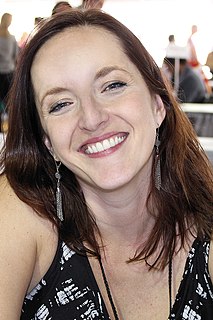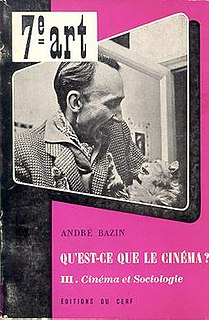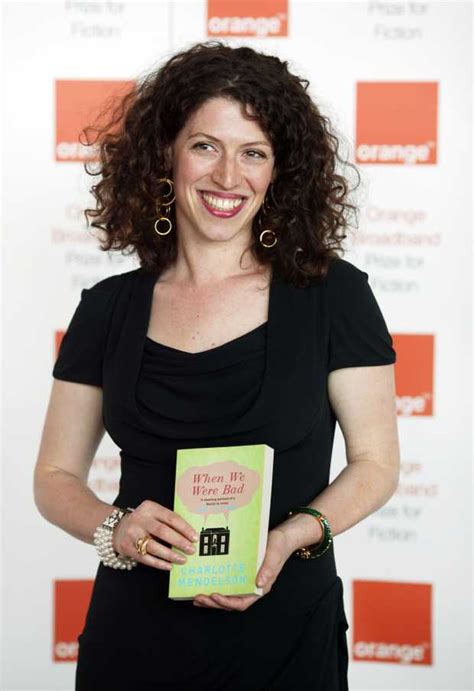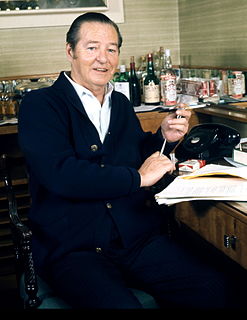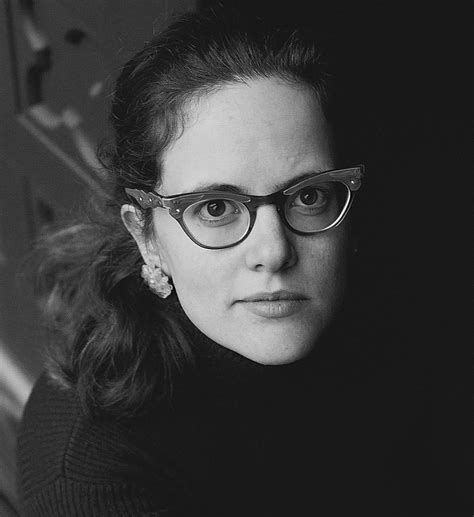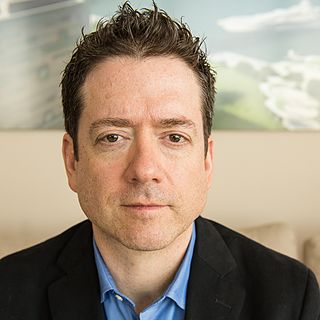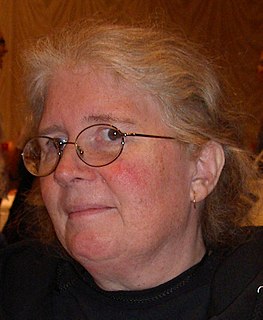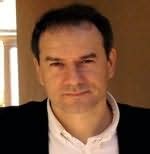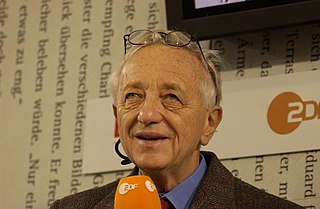Top 888 Novelist Quotes & Sayings - Page 13
Explore popular Novelist quotes.
Last updated on November 12, 2024.
Unlike the time sink of binge-watching a TV series, podcasts actually made me more efficient. Practically every dull activity - folding laundry, applying makeup - became tolerable when I did it while listening to a country singer describing his hardscrabble childhood, or a novelist defending her open marriage.
As a novelist, I cannot occupy myself with "characters," or at any rate central ones, who lack panache, in one or another sense, who would be incapable of a major action or a major passion, or who have not a touch of the ambiguity, the ultimate unaccountability, the enlarging mistiness of persons "in history." History, as more austerely I now know it, is not romantic. But I am.
I am not expecting anyone to feel sorry for me, but when friends ask how it feels to be a debut novelist who has also been long listed for the Man Booker prize, I have to admit that my response has confused me. I am so overwhelmed, so delighted, so honoured and so surprised, I have come out in a violent cold.
I grew up writing. It was very natural in my household. My father was a poet, and his mother had been a novelist back in Hungary. I don't think I really thought about it being my career until high school, which is still pretty early, but it was a while there of just assuming this was something everyone did all day long.
The illusion of the seventh veil was the illusion that you could get somebody else to do it for you. To think for you. To hang on your cross. The priest, the rabbi, the imam, the swami, the philosophical novelist were traffic cops, at best. They might direct you through a busy intersection, but they wouldn't follow you home and park your car.
The thought of the novelist lies not in the remarks of his characters or even in their introspection but in the plight he has invented for his characters - in the juxtaposition of those characters and in the lifelike ramifications of the ensemble they make: their density, their substantiality, their lived existence actualized in all its nuanced particulars, is in fact his thought metabolized.
Today we can say that at last the director writes the film. The image--its plastic composition and the way it is set in time, because it is founded on a much higher degree of realism--has at its disposal more means of manipulating reality and of modifying it from within. The film-maker is no longer the competitor of the painter and the playwright, he is, at last the equal of the novelist
Say you're an American novelist, published by the largest publishing house in the world. Their goal is to make as much money from you as possible, to have as many people read your book in as many formats as possible. How can you hope to speak intimately to the numbers of people that represent the book sales required?
Novelists are perhaps the last people in the world to be entrusted with opinions. The nature of a novel is that it has no opinions, only the dialectic of contrary views, some of which, all of which, may be untenable and even silly. A novelist should not be too intelligent either, although he may be permitted to be an intellectual.
I think of myself as a narrative artist. I don't think of myself as a novelist or screenwriter or playwright. All of those modalities of processing and experiencing narrative are obviously very different, and I'm not sure that I prefer any one to the other. I think the novel gives you the opportunity to have a kind of interiority that you can't have in the theater, which is pure exteriority.
I teach in M.F.A. programs now, and I think that's a great way to become a novelist, but I mourn that Pete Dexter and Joan Didion's route is maybe less likely because there are fewer of those jobs. I always liken it to playing piano in some great dive jazz bar. You didn't pick the songs, you played what people asked for, but you got your chops.
Show me a novelist – or, indeed, a reader – who wasn’t a socially awkward, self-conscious adolescent, prone to clumsiness and excessive reading and I’ll… well, I’ll probably bang my shoulder on the door frame as I storm out. Many of the most unforgettable female fictional protagonists are gauche, self-doubting, plain and think too much.
When, however, one reads of a witch being ducked, of a woman possessed by devils, of a wise woman selling herbs, or even a very remarkable man who had a mother, then I think we are on the track of a lost novelist, a suppressed poet. . . indeed, I would venture to guess that Anon, who wrote so many poems without signing them, was often a woman.
The dominant and most deep-dyed trait of the journalist is his timorousness. Where the novelist fearlessly plunges into the water of self-exposure, the journalist stands trembling on the shore in his beach robe. The journalist confines himself to the clean, gentlemanly work of exposing the grieves and shames of others.
Why should a novelist not also be a historian? To force unnatural divisions within the English language is to work against its capacious and accommodating nature. To expect a writer to produce only novels, or only histories, is equivalent to demanding from a composer that he or she write only string quartets or piano sonatas.
It seems priggish or pollyannaish to deny that my intention in writing the work was to titillate the nastier propensities of my readers. My own healthy inheritance of original sin comes out in the book and I enjoyed raping and ripping by proxy. It is the novelist’s innate cowardice that makes him depute to imaginary personalities the sins that he is too cautious to commit for himself.
When the Irish novelist John McGahern was a child, his sisters unlaced and removed one of his shoes while he was reading. He did not stir. They placed a straw hat on his head. No response. Only when they took away the wooden chair on which he was sitting did he, as he puts it, 'wake out of the book'.
I grew up in the D.C. suburbs, and what I like about that place is that there's not a strong regional affect in the cultural imagination like there is in Dallas or San Francisco or New York City. You have a little more freedom as a novelist this way. The suburbs become a generic idea, and the place doesn't intrude into the narrative.
I once did an event with Ian Rankin where he said he didn't really need to do much background research because his books are set in the present, and I just thought: 'You lucky, lucky beast!' because as a historical novelist, I live constantly on the edge of wondering whether tissues had been invented.
God is a novelist. He uses all sorts of literary devices: alliteration, assonance, rhyme, synecdoche, onomatopoeia. But of all of these, His favorite is foreshadowing.And that is what God was doing at the Cloisters and with Eudora Welty. He was foreshadowing. He was laying traps, leaving clues, clues I could have seen had I been perceptive enough.
The lucidity of the battle narratives, the vigor of the prose, the strong feeling for the men from generals to privates who did the fighting, are all controlled by a constant sense of how it happened and what it was all about. Foote has the novelist's feeling for character and situation, without losing the historian's scrupulous regard for recorded fact. The Civil War is likely to stand unequalled.
I met, not long ago, a young man who aspired to become a novelist. Knowing that I was in the profession, he asked me to tell him how he should set to work to realize his ambition. I did my best to explain. 'The first thing,' I said, 'is to buy quite a lot of paper, a bottle of ink, and a pen. After that you merely have to write.'
Things seem to be at a boiling point all the time. In fact, it has been that way my whole life. I find it interesting, and I like the fact that the emotions are in your face all the time. You always know where you stand. None of that "we don't have any racial problems here" attitude that you get, say, up north. All of this is rich fodder for a crime novelist.
When I say that George Eliot has long been my hero, I mean to include those aspects of her thought and temperament that have been disparaged or dismissed or ignored. She was, after all, a novelist who did not eschew politics or polemics - sometimes silently though defiantly, as in her relationship with George Henry Lewes.
We are befouling and destroying our own home, we are committing a slow but accelerating race suicide and life murder - planetary biocide. Now there is a mighty theme for a mighty book but a challenge to which no modern novelist or poet has yet responded. Where is our Melville, our Milton, our Thomas Mann when we need him most?
Like every novelist, I fantasise about film. Novelists are not equipped to make a movie, in my opinion. They make their own movie when they write: they're casting, they're dressing the scene, they're working out where the energy of the scene is coming from, and they're also relying tremendously on the creative imagination of the reader.
I am not a psychological novelist, and I try very hard not to allow the reader to see the plight or circumstances of the characters as individual psychological plights. That's my preference; still, a lot of people do read my novels as psychological studies, and they're right to read them that way too, if that's what they mean to them.
The detective story itself is in a dilemma. It is a vein which is in danger of being worked out, the demand is constant, the powers of supply variable, and the reader, with each one he absorbs, grows a little more sophisticated and harder to please, while the novelist, after each one he writes, becomes a little more exhausted.
Back when the concept of organ transplants qualified as science fiction, novelist Maurice Renard wrote a thriller called 'Les Mains d'Orlac.' Call it a bastard offspring of 'Frankenstein;' its plot revolved around the old theme of Science Giving Us Stuff We Shouldn't Have - in this particular case, restoring severed body parts.
As you know, I am a novelist, and I really want to write novels. But I knew enough about the Dreyfus case to understand immediately why what happened to Dreyfus was not merely a cause celebre from the end of the 19th century, but an event that could be shown to teach us lessons of the greatest importance for our own time.
I stopped performing because I don't have the temperament of a performer. You have to want to do the same thing over and over again. Once I got it right, I didn't want to do it again. I always use the analogy of a novelist who has to read his novel in public night after night. I just didn't want to do it.
I reluctantly signed up for a journalism major, thinking I needed a fall-back way to make money should my career as a novelist fail to take off. As I started to try on journalism, including doing internships and working at the campus paper, I found I actually liked it. So I started to want to be a journalist.




